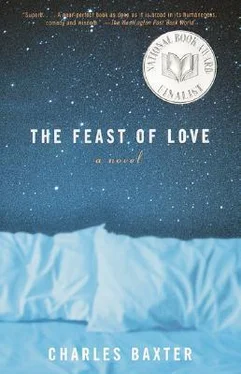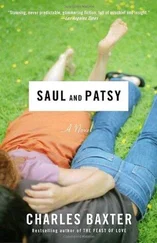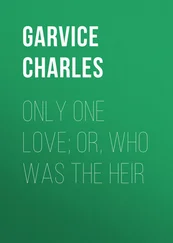After ten minutes, it was too dark, and they stopped playing. And this guy, David, came over to where she was, and Diana stood up, and he put his arm around her shoulders, and she put her arm around his waist, and they started walking toward his car, that way, his arm around her shoulder, her arm around his waist. It couldn’t have taken more than fifteen seconds for them to get to that car. But I’ll remember how they looked all my life.
I’d never seen Diana with that settled contentedness before. It’s funny how you can tell when people are in love.
They passed under one of those streetlights they have near the parking area. Bradley tugged at the leash, but I was not to be moved. And I saw Diana clearly, leaning into this fellow, her head bent to the left so that it was resting on his shoulder, and this insane eventuality happened. I felt this punch in my stomach. Standing there, across the street, in the shadows where it was possibly my fate to live, forever after, I felt this punch in my stomach.
I could see instantly what I was missing. That she was beautiful in a way I hadn’t noticed before. Suddenly I missed her lazy manner of reading the editorial pages aloud on Sunday morning and I missed the way she said good night by whispering it in my direction and I missed everything about her, including how mean she could sometimes be. I remembered the way she blew the bangs away from her forehead by jutting her lower lip outward and blowing a stream of air, perfected by her years of playing the oboe in high school, upward. Sick with memory, I was in love with Diana, genuinely, still, or maybe for the first time, at least this way.
They got in the car and now she put her hand on his chest and started kissing him. They kissed for a while. I should have turned away. I tried.
A fire truck went by a few blocks away, howling. Chloé came and collected Oscar and they went home together in Oscar’s beat-up Matador.
I staggered home and couldn’t sleep. It occurred to me for the first time that I had smashed my life with a hammer.
THE JOB AT JITTERS became a different job.
Couples, plain-style Americans, would come in, hand in hand, arm in arm, treating each other as delicacies. They’d order a pound of coffee or they’d order decaf cappuccino, and they’d sit down at a table and talk, leaning toward each other, their secretive knees slowly but ever-so-surely touching. Every day this familiar tableau that I myself had painted in The Feast of Love was presented to me as a done deal, an actuality. In truth, there are only two realities: the one for people who are in love or love each other, and the one for people who are standing outside all that.
The mere sight of happiness made me groan inwardly. Now, when I walked in the parks, all I saw were couples, Chloé and Oscar types of every description. At intersections I would find myself behind couples necking in the backseat, or some woman next to a guy in the front. I would watch. I would see her toying with the back of his neck. Twirling her fingers there. Playing with the little curls. Sometimes I’d see people smiling for no reason. Just smiling, happy with life. This enraged me. I suffered from the happiness of others.
It helps that in Michigan everyone goes inside from November through April. But from May until October they are outside, on display, and all of a sudden if you are single, you have a window to heaven and no way at all to get in.
My attitude toward my art changed. Now I didn’t paint my canvases; instead I vandalized them. Harry Ginsberg came over one evening and said, “I have heard of action painting, but this is new. Bradley, you are at last a pioneer in the visual realm. You are post-action and post-Pop. This, what you are doing, is devastation painting. You are the first painter of the new millennium.”
I was pleased by his comment.
ONE EVENING I LEFT Bradley behind in the house, and I drove to Jackson, Michigan, which is about thirty miles west of Ann Arbor. I had no idea what I would do when I arrived there. It was just a place to go. Jackson is one of those hopeless-case cities that are cited in magazines at the very bottom when they list America’s most livable communities, one of those working-class locales where they’re all repairing cars in the front yard and otherwise having fights and breaking beer bottles over the nearest head. The houses aren’t painted, and the siding is falling off. They’ll kill you for a nickel and steal anything that isn’t nailed down. What can I say? Folks there are enjoying themselves any way they can.
When class warfare erupts in America, as it must within the next decade, it’ll start in Jackson, probably. Those citizens are not being fooled.
Anyway, I found myself driving to Jackson’s one tourist attraction, the Jackson Cascades. This guy named Sparks built it in the 1930s. He was a radio tycoon. He thought Jackson needed some waterfalls, for the view. It needed something. But there weren’t any visible waterfalls except for the ones that Consumers Power had already dammed up. So he built this thing in the central city park. It’s huge, the size of a football field. Water gubbles out at the top, where it’s been pumped, and it flows down these ten or so artificially built cascades, like a display in a hotel lobby in Las Vegas, and you sit in the chairs they have, having paid your four dollars, while computer-controlled lights play over these cascades — it only opens after dark — and the speakers they’ve attached to telephone poles play Mantovani and Neil Diamond and the 101 Strings. This is where I decided to go to collect my thoughts.
The water doesn’t flow during the day. It sits there. Mosquitoes breed in it. At night they hatch and go insane. They go after you.
This was a Tuesday night. I bought my ticket and sat down in a sort of bleacher chair. The management gives you a fly swatter, a little one with Jackson Cascades printed on it, and you’re supposed to swat the mosquitoes with this device. Neil Diamond’s “Song Sung Blue” was blaring over these internment-camp speakers, and I was sitting there with my head in my hands wondering what I was doing in Jackson, Michigan. The colors on the water were turning from magenta to a sort of hot pink, and I was having this insight that my parents had let me loose in the world without explaining anything of importance to me.
Down below me were some families, likewise sitting, likewise watching this spectacle but perkier than I was. One child wearing Oshkosh overalls was running in widening circles. He was yelling, “I’m gonna explode!” I nodded at him. Okay with me, kid. You just explode right there. I’m watching, and I’ve got the good view.
The music switched to Mantovani, this string slop, pouring molasses over hapless George Gershwin.
In front of me this picture-perfect high school couple was sitting on a bench. He looked a little bit like the guy that Diana was seeing, and she looked a tiny bit like Diana. The resemblance was close enough to indicate God’s trickster pranksterism. They were talking. Then, God help me, they were kissing. Everywhere I went I saw people kissing. It was this smooch conspiracy. These two were holding hands, and with the hand that was free, she was swatting mosquitoes on his back, and he was swatting mosquitoes on hers.
I found them unbearable. Another couple in love, this time at the Jackson Cascades, swatting mosquitoes off each other’s backs, and they both looked dirt-poor, knowing the system was rigged against them, and they didn’t care because they were both sedated with amour.
Down with love, I thought, and all its theatrics. I felt a sort of energetic, visionary despair.
I raced back toward my car. As I drove home, typically, I was arrested for speeding. I, Mr. Toad, was traveling eighty-five miles an hour on I-94. I was given a breath test. Sober sober sober. Oh, I am a sober man, and the state trooper wrote me a ticket to confirm my sober crime.
Читать дальше
Конец ознакомительного отрывка
Купить книгу












